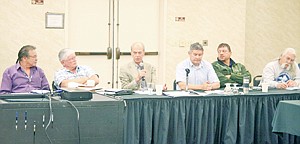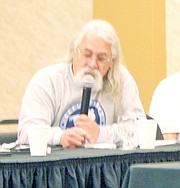Officials hear water-rights pleas
There was more frustration and waiting for Lincoln County on Wednesday, as representatives from the county had little luck in Polson negotiating with the Confederated Salish and Kootenai Tribes’ water rights off the Flathead Reservation.
The gathered group of concerned citizens, lawyers, tribe and government officials listened to more than five hours of presentations, public comment and questions and technical matters dealing with the complicated water rights issue that is the last to be settled in Montana. For the Confederated Tribes, the water stood for possible monetary gain and area development, but also for something far less materialistic.
“We’ve been here 14,000 years,” said Steve Lozar, a member of the CSKT Tribal Council. “We see water not just as H2O, as hydrogen and oxygen. We see it as our life’s blood.”
The CSKT’s water rights claims go back to 1855, when then-Gov. Isaac Stevens of the Washington Territory made a treaty with the Salish, Kootenai and Pend d’Oreilles tribes of the inland Northwest that in exchange for a large portion of their land, the tribes would be granted the Flathead Reservation and would reserve their traditional hunting and fishing areas.
The trouble the Tribes are running into is that much of those areas are in populated Lincoln County (as well as Flathead, Missoula, Lake, Sanders, Granite and Gallatin Counties). The watersheds stretch far and wide, and some prime real-estate may be affected in the drainage basins.
Lincoln County Commissioner Tony Berget, who represents Libby, drew issue with the proposed creeks chosen for the Tribes in Lincoln County. Libby, Troy and Eureka had been slated in January’s initial model to allow use of Libby, O’Brien and Graves creeks, respectively. Each of these was unworkable for the commissioners.
“Why these three streams? These are too important for our community,” Berget said. “These are the lifeblood of our community. There are 75 or better other streams to choose from!”
Libby Creek runs through the town of Libby, O’Brien Creek is Troy’s drinking-water supply and Graves Creek directly feeds into the Glen Lake irrigation district.
Steve Curtis, a prospective candidate to fill retiring Lincoln County Commissioner Marianne Roose’s position, found particular problems with the possible loss of water to Glen Lake, as that is where he lives and works.
Jay Wiener, an attorney for the state, who was clear that the water rights draft naming Libby, O’Brien and Graves Creeks was a working prototype, addressed his fears.
“We had nothing to talk about until we roughed out this draft, so everyone could throw rocks at it,” Wiener said, referencing the many problems both Tribe and non-Tribe representatives had with the initial plan, released in January.
“We’ve started putting meat on the bones and are listening to your concerns. This isn’t something we are trying to sneak past you.”
Most Lincoln County citizens and officials remained quiet during the technical and extremely tedious initial meeting, which last more than five hours in a small conference room and held more than 100 people.
Immediately following that meeting, the Lincoln County representatives persuaded the Tribal and state attorneys to join them for a lunch meeting where the Troy, Libby and Eureka concerns were addressed.
Mike Cuffe, state representative for House District 2, understood the difficult situation those in Helena were facing, but wanted to reiterate that he had lived to see Lincoln County pushed around before, and wasn’t about to let it happen again.
“In 1975, I walked across the top of the Libby Dam with Gerald Ford and I couldn’t imagine a 1,200 employee mill being gone,” he said. “And now we can’t imagine the dam being gone? If we don’t think we are getting a fair shake, we’re going to be bulldogs.”
The general consensus from Lincoln County’s representatives was that if the slated creeks were not changed, they would fight to kill the compact with the tribes, and thus killing it for all counties involved.
The state’s attorneys warned that killing the compact would just drop both the tribes and counties would be dropped into nasty and lengthy litigation, in which case Lincoln County could well lose those creeks anyway, benefiting few and costing all potential millions.
“We want the compact to be palatable for everyone,” said Chris Tweeten, state’s attorney. “Of course we are open to talk about it. Why would we want to keep Lincoln County the highest unemployment in Western Montana? Why would we do that?”






